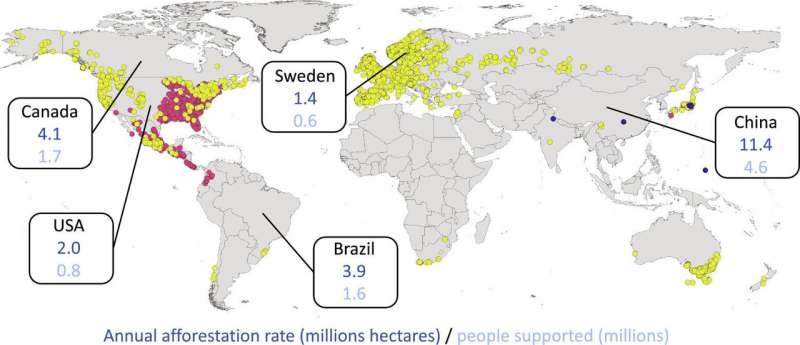This article has been reviewed according to Science X's editorial process and policies. Editors have highlighted the following attributes while ensuring the content's credibility:
fact-checked
peer-reviewed publication
trusted source
proofread
Growing mushrooms alongside trees could feed millions and mitigate effects of climate change

Growing edible mushrooms alongside trees can produce a valuable food source for millions of people while capturing carbon, mitigating the impact of climate change, a new study by University of Stirling scientists has found.
The approach not only reduces the need for deforestation to make way for crops, but it also incentivizes tree planting.
The study by Paul Thomas, Honorary Professor at the University of Stirling's Faculty of Natural Sciences, and Professor Alistair Jump, Dean of the Faculty of Natural Sciences,has been published in the Proceedings of the National Academy of Sciences. The pair spent two years working in partnership, collating and analyzing data from published sources.
There is currently a significant global issue of land-use conflict between forestry and food production and, as a result, net loss of forest area remains high at some 4.7 million hectares per year, according to data for 2010 to 2020. Demand for agricultural land is the biggest driver of global deforestation and this is forecast to accelerate.
Analysis by Professor Thomas found that the cultivation of edible ectomycorrhizal fungi (EMF) in forests may sequester up to 12.8 metric tons of carbon per hectare annually and produce a nutritious food source for nearly 19 million people per year.
Professor Thomas said, "We looked at the emerging field of mycoforestry, where fungi that grow in symbiosis with living trees are used to create a food crop from new tree plantings, and we found that production of fungi using this system can lead to a very significant sequestration of greenhouse gas.
"This is a huge benefit which means that by producing this food we can actively help mitigate climate change. When we compared this to other major food groups, this is the only one that would result in such benefits—all other major food categories lead to a greenhouse gas emission during production.
"We calculate that if this system was combined with current forest activities, the food production levels could be huge. If it had been used in forestry that has taken place during the last ten years, we could have produced enough food to feed 18.9 million people annually.
"For China alone, their forestry activity for the last ten years could have put in place a food production system capable of enough calorific output to feed 4.6 million people annually."
Emerging technology
Professor Thomas said the technology is emerging and much more needs to be done to realize these benefits. He has called on researchers to join the field and for support from relevant agencies.
He added, "This food production system is highly scalable, realistic and a potentially powerful route to sequester greenhouse gas. It would help with biodiversity and conservation globally, triggering rural socio-economic development and providing an incentive for increased tree planting rates with all the associated benefits that brings."
More information: Paul W. Thomas et al, Edible fungi crops through mycoforestry, potential for carbon negative food production and mitigation of food and forestry conflicts, Proceedings of the National Academy of Sciences (2023). DOI: 10.1073/pnas.2220079120
Journal information: Proceedings of the National Academy of Sciences
Provided by University of Stirling





















